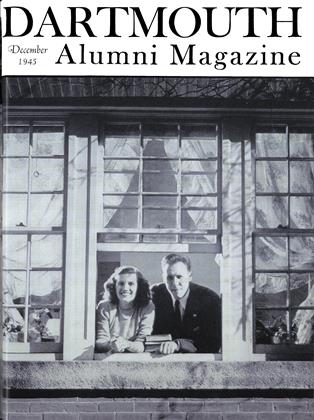Dartmouth Does the Trick
The perplexing problem of finding living quarters for the hosts of returnees to New England colleges from various services, all eagerly bent upon resuming their educational courses under the G.I. Bill of Rights, is currently the dire headache of the managements of these institutions. Many of the men have married during their years of war absence, and not a few have a third member of the family' Each institution has had to work out its peculiar transitional problem from wartime conditions—and the shortage of housing and of materials for new construction now hampers most in meeting this new demand.
Alone among them, the management of Dartmouth College, alert early to the size of the prospective inrush, has rearranged facilities to meet all present needs. Two of it bigger dormitories have been reconditioned a* dwellings for married students and wives. And in the Spring, 50 prefabricated houses will b set up near the campus for student veterans and their families. Thus does Dartmouth show the way to her sister institutions in this vital matter.
Dartmouth's Memorials
Dartmouth College has hit upon a plan for living war memorials which should give pause to those zealots partial to cold shafts of stone Sons of Dartmouth graduates who died in the war will be given four-year scholarships.
These Hopkins Scholars, as they will be called in honor of the Green's retiring prexy may lovingly remember their parents' sacrifice and gain solace in the hope that studies will bear ripe fruit in a democratic world.
What granite pile, what metal wreath no matter how large, could entail the potential benefit to mankind that these memorial scholarships offer? If Dartmouth can institute such a system, why can not other schools and many communities do the same? On a widespread scale, this sensible use of money would have a mighty impact upon our civilization of the future.
Invasion of Dartmouth
One of the more serious problems confronting American colleges today is that of the returning veteran who brings his wife to the campus with him. The intensity of the problem usually varies with the distance from a large town, since even those institutions which are co-educational and do not frown on married students in peace time are hardly equipped to furnish "married quarters" on a large scale.
The appearance of college wives en masse will change many traditions in the erstwhile exclusively masculine colleges, and one wonders whether the changes may not prove more lasting than the condition which inspired them. Dartmouth, for example, which dominates the tiny town of Hanover, N. H., in which it is situated, and which is far from any large city, has long cherished a rugged masculinity, made possible by its monastic remoteness. Now two dormitories are being turned over to married students, and attempts are being made to secure the construction of temporary housing to meet the needs of other married veterans-expected to be about 20 per cent of the veteran group. And an undergraduate writes in the DARTMOUTH ALUMNI MAGAZINE that already his classmates are beginning to wear ties and sport coats to classes. He speculates, gloomily, that by the time the feminine invasion is really on, "Dartmouth should approach the city colleges with their gray flannels and bow ties (ugh)." It is a sobering thought, not only for Dartmouth men, but for all who cling to mellow and sturdy traditions.
 View Full Issue
View Full Issue
More From This Issue
-
 Article
ArticleTHE DEAN UNMASKED
December 1945 By HERBERT F. WEST '22, -
 Article
ArticleTHE VETERAN RETURNS
December 1945 By PROF. Wm. STUART MESSER, -
 Class Notes
Class Notes1945
December 1945 By ARTHUR NICHOLS, JOHN W. CALLAGHAN -
 Class Notes
Class Notes1917
December 1945 By MOTT D. BROWN, DONALD BROOKS -
 Article
ArticlePRESIDENT DICKEY INDUCTED
December 1945 -
 Class Notes
Class Notes1918
December 1945 By ERNEST H. EARLEY, DONALD L. BARR
Lettter from the Editor
-
 Lettter from the Editor
Lettter from the EditorCOMMUNICATIONS
MARCH, 1928 -
 Lettter from the Editor
Lettter from the EditorEditorial Comment
MARCH 1930 -
 Lettter from the Editor
Lettter from the Editor'Round the Girdled Earth
March 1944 -
 Lettter from the Editor
Lettter from the EditorDateline Hanover
MARCH • 1986 By Douglas Freewood -
 Lettter from the Editor
Lettter from the EditorSettling in in Hanover
JUNE 1983 By Douglas Greenwood -
 Lettter from the Editor
Lettter from the EditorA Family Affair
JANUARY/FEBRUARY 1986 By Douglas Greenwood


